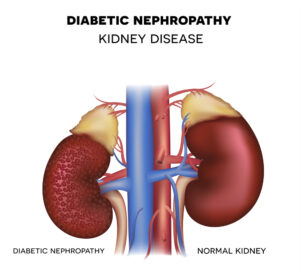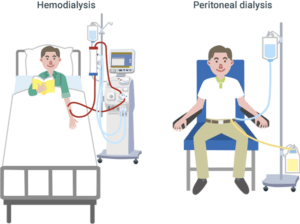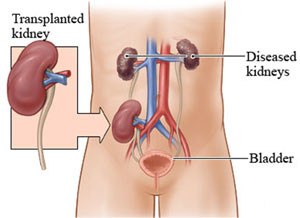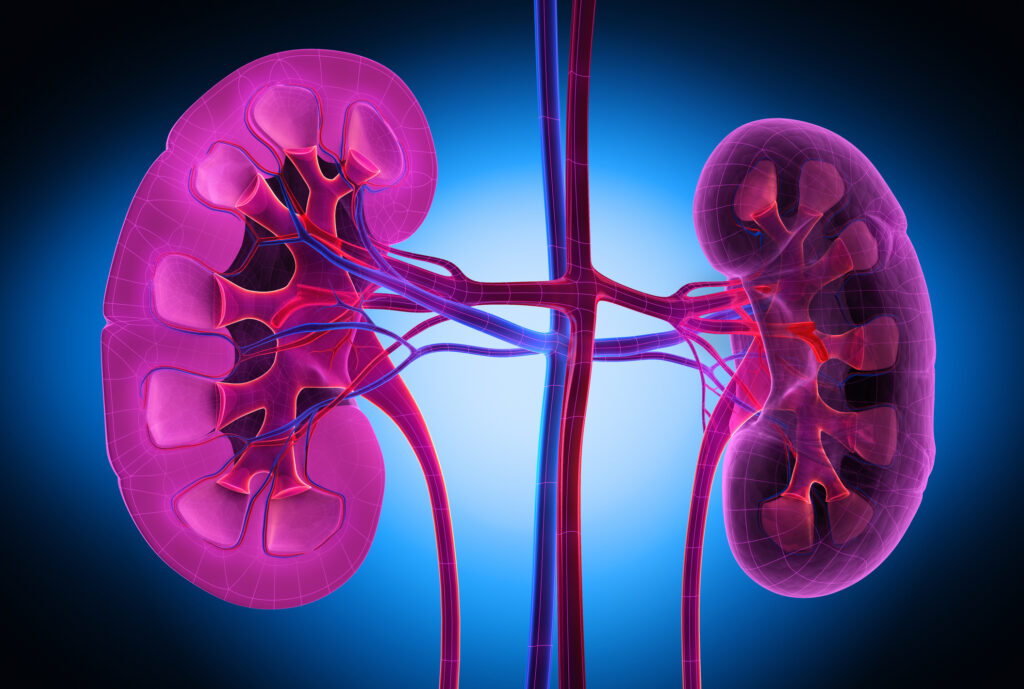Contents
- 1 What is Diabetic Nephropathy?
- 2 Diabetic Nephropathy Stages
- 3 Symptoms of Diabetic Nephropathy
- 4 Causes of Diabetic Kidney Disease (DKD)
- 5 How Diabetes Affects Kidneys?
- 6 When Am I Prone to Diabetic Nephropathy?
- 7 Diagnosis of Diabetic Nephropathy
- 8 Treatment for Diabetic Nephropathy
- 9 Kidney Transplant
- 10 Ways To Keep Your Kidneys Healthy
- 11 Conclusion
What is Diabetic Nephropathy?
Nephropathy is a medical term given to kidney disease. So, diabetic nephropathy basically means kidney disease occurring due to diabetes. The disease hits almost one-third of people with diabetes. It’s not that only diabetes causes kidney disease.

But yes, it’s very true that kidney disease caused by diabetes is the worst. The reason for this is that people with diabetes already suffer from different health conditions like hypertension (high blood pressure), high cholesterol levels, and blood vessel disease.
People with diabetes can also suffer from some other kidney-related disorders such as nerve damage to the bladder, or bladder infections.
There is a big difference between kidney disease when it is seen under type 1 diabetes and type 2 diabetes. In people with type 1 diabetes, diabetic nephropathy rarely begins to show its signs and symptoms before 10 years. But, in type 2 diabetes, it so happens that some patients are diagnosed with kidney disease by then they come to know that they are diabetic.
Diabetic Nephropathy Stages
There are 4 stages of DKD or Diabetic Nephropathy categorized on the basis of Glomerular Filtration Rate (GFR). GFR is nothing but the most important function that your kidneys need to perform, which is to filter the blood. Usually, in a normal body kidneys have a GFR of 100. The kidneys’ functions happen to decrease in Diabetic Kidney Disease, so the stages of damage are:
Stage 1: It is the gentle and merciful stage of the disease where the kidneys can be restored for their proper functioning through treatment. At this stage, the GRF is above 90%
Stage 2: The damage to the kidney is moderate and GFR is 60%. At this stage, the doctor does not diagnose kidney disease.
Stage 3: When GFR of 15-60%, kidney disease is diagnosed.
Stage 4: If the GFR goes below 15%, then it’s a complete kidney failure.
Symptoms of Diabetic Nephropathy
As mentioned above, usually you don’t get to see any of the symptoms of diabetic nephropathy in its initial stages. These are only seen when the condition gets worse. Some of the symptoms include:
- Poor appetite
- Nausea
- Drowsiness
- Swelling of the hands, feet, and face
- Itching
- Weakness
- Trouble sleeping
- Difficulty in concentrating
- Muscle twitching
- Abnormalities in the heart beating
Drowsiness and itchiness are the two symptoms that you see only at the end-stage kidney disease.
Confusion and difficulty in concentrating happen because the poisonous level rises high in your body. When your kidney damage progresses, the kidneys become unable to flush out the waste from your blood. The waste keeps on building in your body and reaches a poisonous level. This is a condition called uremia. And a person suffering from uremia is usually confused and occasionally becomes comatose.
Causes of Diabetic Kidney Disease (DKD)
If you look at the number of cases of the disease, two-thirds of them occur due to:
- Diabetes (High Blood Sugar): Developing diabetes before the age of 20 can also make you inherited diabetic nephropathy faster as compared to others.
- Hypertension (High Blood Pressure): Unregulated blood pressure or possessing high blood pressure is one of the most common causes of diabetic Kidney Disease
- Heavyweight: Having a higher BMI can also be a big cause of diabetic nephropathy that comes along with other diseases like obesity, hypertension, cardiovascular problems, etc.
Some other causes are:
- Pyelonephritis: It a resurrect kidney infections
- Vesicoureteral: It is a condition that allows urine to store in your kidneys.
- Enlarged prostate, kidney stones, and Cancers: These cause persistent obstruction in the urinary tract.
- Glomerulonephritis: a condition that inflames the kidney’s filtering units, called “glomeruli”.
How Diabetes Affects Kidneys?
When diabetes hits a person, it adversely affects the kidneys too. Priorly, if you are a diabetic, three of your internal organs will be affected:
- blood vessels,
- nervous system,
- and urinary tract.
Let’s understand them one by one:
- Blood vessels run throughout our body and have a lot to do with the kidneys too. They act as the filtering units of kidneys. Any sort of obstruction and clogging in the working of blood vessels can cause kidney damage which can be a fatal action.
For a diabetic, fluctuations in blood sugar level make the blood vessels narrow and hamper their elasticity. Due to this, less blood and oxygen gets supplied throughout the body. This increases the risk of high blood pressure and damage to blood vessels.
- The nervous system is spread throughout the body to regulate the process of sending and receiving messages to the different parts. Diabetes can cause big harm to the nerves in the kidneys as high blood sugar levels cause injury to them.
Damage caused to your nerves from diabetes can leave them unable to receive messages from your brain.
For instance, if the nerves are unable to send the message about a full bladder to your brain then the pressure from a full bladder can cause damage to your kidneys.
- Diabetes is a leading cause of Urinary tract infections, sexual dysfunction, and various other issues related to the bladder.
If the urine in the bladder stays there for longer it can lead to different urinary tract infections because of the bacteria in the urine. It also has a negative impact on the sensory functioning of the body.
When Am I Prone to Diabetic Nephropathy?
Diabetes will surely harm your kidneys. But the factors mentioned below will increase the rate of progression of damage even more. The factors are:
- Smoking
- Aging (usually after 65, your GFR gets to lower causing kidney disease)
- Obesity
- Chronic inflammation
- High blood pressure
- Insulin resistance
- Increased levels of blood lipids (fats)
- Race and Ethnicity (more common in African Americans, Native Americans, and Asian Americans)
- Sex (more common in men than women)
Diagnosis of Diabetic Nephropathy
First, the doctor will inquire about your family medical history. Then, he might ask if you are urinating more than normal. Only then, he will move forward with some physical exams.
- Blood tests, which will indicate the number of waste products in your blood. It is used to detect the level of two substances, namely urea, and creatinine, responsible for kidney functions
- Urine tests, to detect the condition of the kidney.
- Imaging tests, to let doctors see your kidneys. These include ultrasound and computerized tomography, and Abdominal CT scan
- Kidney Biopsy, which is a lab testing of kidney tissues to know about the problems.
- Completes Blood Count to detest anemia. Kidneys produce erythropoietin, a hormone. This helps your bone marrow to create red blood cells. In case of severe damage to the kidneys, erythropoietin is not produced sufficiently.
- Electrolyte level test: The level of potassium increases and the level of bicarbonate decreases. This increases the level of acid in the blood.
- Blood Urea Nitrogen and Creatinine Test. When your kidneys start to fail, urea nitrogen and creatinine in the blood elevates.
Some other tests are:
- Abdominal MRI
- Bone density test
Treatment for Diabetic Nephropathy
Since high blood sugar levels are the major cause of this disease, maintaining blood sugar levels close to normal is the first thing you need to work on. Unless you achieve this, no treatment is going to help you. Only normal blood sugar levels will help in slowing the progression of diabetic nephropathy.
Medications for Diabetic Nephropathy

- SGLT2 inhibitors: this controls high blood glucose levels
- Angiotensin-Converting Enzyme (ACE) inhibitors: However, some of the medicines under this drug category, such as ramipril (Altace), quinapril (Accupril), and lisinopril (Prinivil, Zestril) are the medicines given to blood pressure patients. But to lower the complications, diabetes patients also rely on these.
- Angiotensin Receptor Blockers (ARBs): If the patient suffers from any side effects of ACE inhibitors, these medications help instead.
If left untreated, the kidneys will fail to function and the only option left to you will be either Dialysis or go for a kidney transplant.
Dialysis
This is a process of filtration basically. When kidneys stop filtering waste from the body naturally, dialysis is required. There are two types of dialysis:

Hemodialysis: In this process, the blood filtration procedure takes outside your body. That is, the blood is filtered outside the body and then returned to the body. Usually, this is done at a dialysis center. But done at home as well.
Peritoneal Dialysis: In this, the blood is cleaned or filtered inside the body itself. A kind of fluid is sent into the abdomen, and this absorbs all the waste from the blood. The fluid is then drained out. And this is done at home.
Kidney Transplant

It is a surgical process. The failed kidney is replaced with a healthy kidney of a living or a deceased donor.
Ways To Keep Your Kidneys Healthy
Below are some of the key points that can keep that fist-sized organ, kidney healthy.
- stay fit and active
- keep your blood sugar level is close to normal
- monitor your blood pressure level
- have the habit of drinking plenty of fluids
- monitor your weight to have a healthy BMI
- don’t smoke
- better avoid otc ( over the counter) pills
- have regular screening for your Kidneys (especially if you have diabetes).
Conclusion
Here we have reached the end. All you need to know is that it is your body and it will be you taking care of it lifelong. You need to be very sure about the impact that certain edible things are going to put on your body. The wisest option is to make a balanced diet chart for yourself and make a note of everything that helps you in a positive manner. More importantly, you should be aware of the methods by which you can monitor your sugar level timely. Hope you ended up having a productive time reading the above article about blood sugar levels.
Do you want to get rid of diabetes? Join our online diabetes consultation program and reverse your Diabetes naturally through lifestyle changes such as a Personalized Diet plan, Exercise, dieticians, and health coaches.


